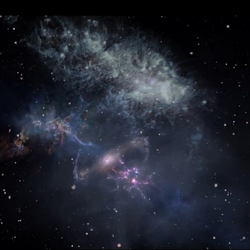
Nov. 28, 2017
By: Michael Feldman
Hewlett Packard Enterprise has found a high-profile customer for its newly minted Superdome Flex in-memory computing platform.
 The computer-maker announced that Stephen Hawking’s Centre for Theoretical Cosmology (COSMOS) will employ the Superdome Flex system to help understand the origins of the Universe and fundamental nature of space and time. The effort is part of a collaboration between HPE, the Cambridge Faculty of Mathematics, and COSMOS. According to the press release, the system will be used to crunch massive cosmological datasets, representing the 14 billion-year history of the Universe.
The computer-maker announced that Stephen Hawking’s Centre for Theoretical Cosmology (COSMOS) will employ the Superdome Flex system to help understand the origins of the Universe and fundamental nature of space and time. The effort is part of a collaboration between HPE, the Cambridge Faculty of Mathematics, and COSMOS. According to the press release, the system will be used to crunch massive cosmological datasets, representing the 14 billion-year history of the Universe.
“Our COSMOS group is working to understand how space and time work, from before the first trillion trillionth of a second after the Big Bang up to today,” said Professor Hawking, the Tsui Wong-Avery Director of Research in Cambridge’s Department of Applied Mathematics and Theoretical Physics. “The recent discovery of gravitational waves offers amazing insights about black holes and the whole Universe. With exciting new data like this, we need flexible and powerful computer systems to keep ahead so we can test our theories and explore new concepts in fundamental physics.”
The datasets are comprised of information collected about gravitational waves, the cosmic microwave background, and the distribution of stars and galaxies. The researchers intend to sort through that data, searching for “tiny signatures” that could reveal the nature of the early universe and how it produced the structures that we observe today.
The rationale for the Superdome Flex is that it’s designed to process huge datasets like this much faster compared to the distributed memory setup of a traditional cluster, since all the memory can be addressed monolithically without the need to stitch the data together over a network of disparate nodes. Not only is such an architecture naturally more performant for processing large datasets, but it’s also easier for developers to program.
The announcement did not describe the specific configuration of the machine that will be used by the researchers, but the platform is designed to support up to 32 processor sockets and 48TB of memory in a single system. The Superdome Flex machine will be paired with a more conventional HPE Apollo cluster, as well as an Intel Xeon Phi-powered system, although again, the announcement did not delve into the specifics of the setup.
Besides cosmological studies, the system will also be used by Cambridge researchers for ocean modeling, medical imaging, the physics of soft matter, and experimental biophysics. Additional research in extra-solar planetary systems, statistical linguistics and brain injuries were also mentioned as possible applications areas.
The short video below, narrated by Hawkings, describes how he and his group intend to use the system to advance the COSMOS work.
<iframe src="https://www.youtube.com/embed/9VcQyimgCXg" width="784" height="441" frameborder="0" allowfullscreen="allowfullscreen"></iframe>
